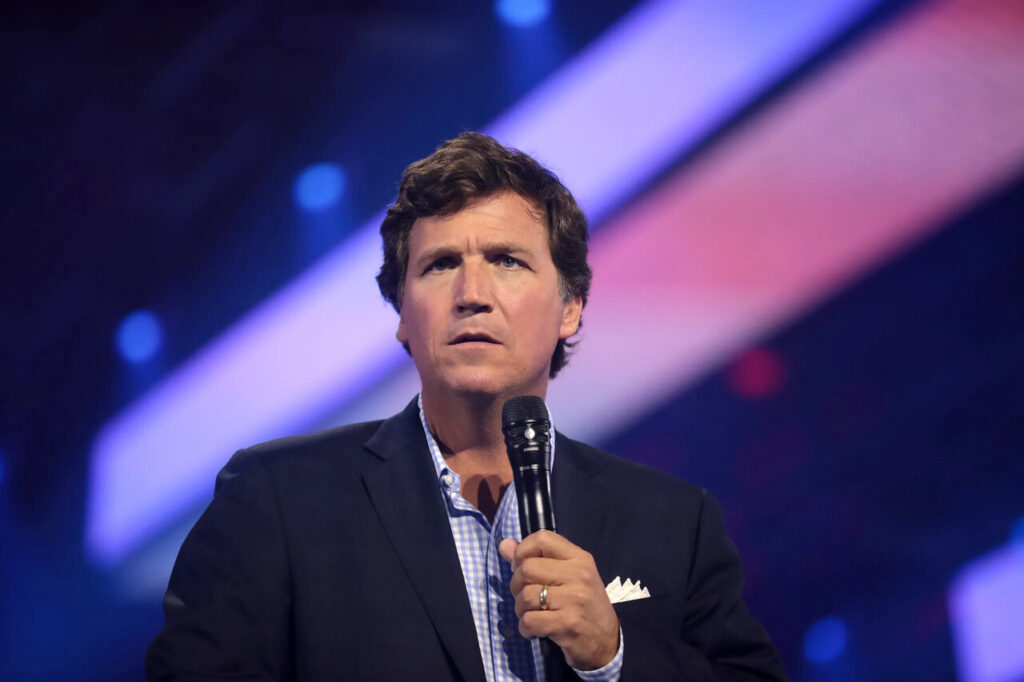TEHRAN – Prominent conservative commentator Tucker Carlson issued a harsh warning against escalating tensions with Iran, explaining the potential conflict as a reckless gamble of the devastating betrayal of President Donald Trump’s core supporters and the reckless gamble of global stability.
In a widely debated X post on Thursday, Carlson clearly set the stance of a powerful anti-interventionist directly challenging the influential, neo-conservative voice within the party as they are closely monitored about their perceived influence on Trump and the key segments of US conservative bases.
Independent journalists argued that there was virtually no support among Trump voters for a “war on change of government in Iran.”
Carlson highlighted what he considers as Trump’s unique political positioning, saying, “Trump ran as a peace candidate for the president. That made him different from traditional Republicans. That’s why he won.”
He argues that launching such a conflict constitutes “a profound betrayal of his supporters,” predicting that it would “end his presidency,” and suggests, explaining “why many of Trump’s enemies are defending it.”
Carlson’s intervention comes at a critical time as indirect negotiations between Iran and the US are underway through Oman.
While the Trump administration’s demand for “zero-level” uranium enrichment could derail diplomatic advances, top Iranian officials have firmly argued that uranium enrichment is the backbone of Iran’s nuclear industry and is unnegotiable.
“Thousands of Americans died in the first week of the war.”
Additionally, in his post, Carlson outlined the serious immediate risks of a potential conflict between Tehran and Washington.
Emphasizing Iran’s traditional military power, Carlson said the country “owns a horrifying arsenal of ballistic missiles, many of which target US military facilities in the Gulf (Persian) as well as our allies and important energy infrastructure.”
The commentator warned that “the first week of the war with Iran can easily kill thousands of Americans,” causing economic collapse due to the surge in oil prices, and asked readers to “consider the impact of $30 in gasoline.”
Carlson further warned that the scope of the conflict could escalate rapidly beyond initial forecasts. “Iran is not Iraq or Libya, and not even North Korea,” he wrote, pointing to the integration of Tehran within the BRICS bloc, which he said represents a large part of the world’s land, population, economy and military power.
Citing Iran’s “wide military ties with Russia” and its important economic ties with China, Carlson concluded, “Attack on Iran could be a world war very easily. We’ll lose.”
He emphasized that these ratings are consistent with the Pentagon estimates and are not “far predictions.”
Carlson’s criticism was central to the role of pro-Israel stakeholders like Mark Levin, a member of the Trump administration’s Homeland Security Advisory Committee and Fox News host.
Carlson portrayed Levin as a symbol of aggressive diplomacy in the competition. “It doesn’t seem like people like Mark Levin care about the possibility of a massive American casualty,” Carlson declared, “scary people” and “whatever it takes.”
He argued that Levin and his allies were deliberately setting impossible conditions. Specifically, it requires Iran to abandon all uranium enrichment, regardless of its purpose – knowing that Tehran will reject them, and thereby “put the Trump administration into the Iranian war of change of power.”
The media claimed that Iranian leaders had learned important lessons from Libya’s Muammar Gaddafi.
“As soon as Gaddafi disarmed, NATO killed him. The Iranian leader saw it happen. They learned an obvious lesson,” Carlson observed.
“One thing people like Mark Levin don’t want is a peaceful solution to the Iranian problem despite obvious benefits for the United States,” Carlson accused.
He criticizes the tactics of auxiliary advocates for diplomacy as “traitors and paranoids,” and refers to Levin’s unfounded claim that the US special envoy to Steve Witkov in the Middle East (West Asia) is a “secret tool for Islamic monarchs.”
Carlson ended with a complaint that “I pray Donald Trump ignores them.”
“A word: Israel!”
Carlson’s warning resonated strongly across social media, particularly on Platform X, and elicited support from a diverse coalition against another tragic war in West Asia.
Rep. Locanna, a progressive Democrat, lends his bipartisan support and says, “There is no war with Iran. The war in Iraq was the biggest foreign policy failure of the 21st century.
Geopolitical analyst Patrick Henningsen offered a pointy criticism of Levin’s motivation, saying, “I wrote a good analysis, Tucker, but you seem to have left one word. This happens to be why Mark Levin is lobbying for the war with Iran… Israel!
Meanwhile, user Liam McCollum praised Carlson’s stance, saying, “Imagine how wonderful it would be if you heard Tucker Carlson on foreign policy.”
With progressive and anti-established figures, Carlson’s convergence of prominent conservative voices underscores the deep unrest surrounding the promotion of neoconservatism for conflict with Iran.
Carlson’s position is consistent with analysis by scholars like John Meersheimer and Stephen Walt. Its influential work argues that the “Israel lobby” puts great pressure on US foreign policy and pushes it towards actions that often serve the interests of Televe, but counteract the broader US strategy and security goals.
Levin’s rhetoric exemplifies this dynamic. Since 2023, he has repeatedly called for the “Samson option,” the concept that the Israeli regime can resort to nuclear weapons, as a threat if the US fails to provide unlimited weapons assistance.
The May 29 accusation that the US is “instructing Israel how to fight” underscores an unwavering alliance with the biggest Israeli demands.

